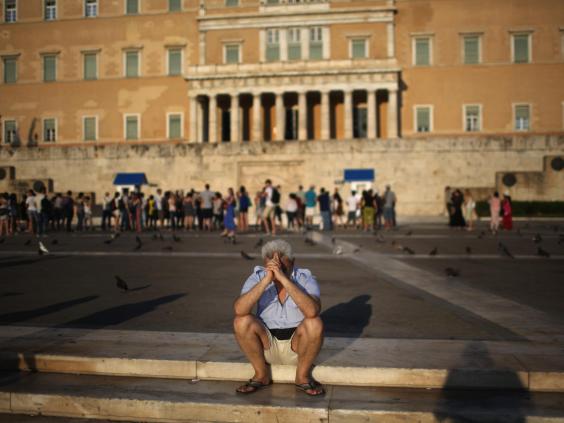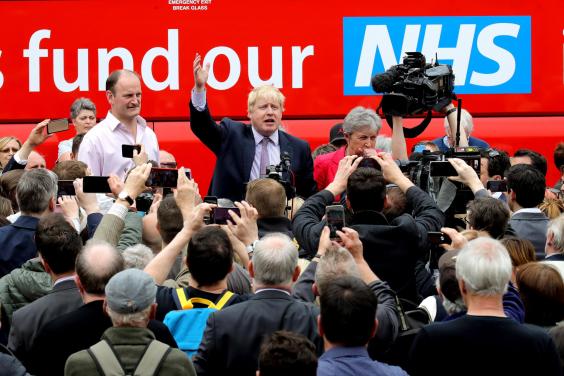
Photos Getty
Once upon a time, not so long ago, there was a place where peace and prosperity reigned. Let’s call this place the West. These lands had once been ravaged by bloody wars but its rulers had, since, solved the puzzle of perpetual progress and discovered a kind of political and economic elixir of life. Big Problems were relegated to either Somewhere Else (the East) or Another Time (History). The Westerners dutifully sent emissaries far and wide to spread the word that the secret of eternal bliss had been found –and were, themselves, to live happily ever after.
So ran, until very recently, the story of how the West was won.
The formula that had been discovered was simple: the recipe for a bright, shiny new brand of global capitalism based on liberal democracy and something called neoclassical economics. But it was different from previous eras – cleansed of Dickensian grime. The period after the two world wars was in many a Golden Age: the moment of Bretton Woods (that established the international monetary and financial order) and the Beveridge report (the blueprint for the welfare state), feminism and free love.
It was post-colonial, post-racial, post-gendered. It felt like you could have it all, material abundance and the moral revolutions; a world infinitely vulnerable to invention – but all without picking sides, all based on institutional equality of access. That’s how clever the scheme was – truly a brave new world. Fascism and class, slavery and genocide – no one doubted that, in the main, it had been left behind (or at least that we could all agree on its evils); that the wheels of history had permanently been set in motion to propel us towards a better future. The end of history, Francis Fukuyama called it – the zenith of human civilisation.
Once upon a time, not so long ago, there was a place where peace and prosperity reigned. Let’s call this place the West. These lands had once been ravaged by bloody wars but its rulers had, since, solved the puzzle of perpetual progress and discovered a kind of political and economic elixir of life. Big Problems were relegated to either Somewhere Else (the East) or Another Time (History). The Westerners dutifully sent emissaries far and wide to spread the word that the secret of eternal bliss had been found –and were, themselves, to live happily ever after.
So ran, until very recently, the story of how the West was won.
The formula that had been discovered was simple: the recipe for a bright, shiny new brand of global capitalism based on liberal democracy and something called neoclassical economics. But it was different from previous eras – cleansed of Dickensian grime. The period after the two world wars was in many a Golden Age: the moment of Bretton Woods (that established the international monetary and financial order) and the Beveridge report (the blueprint for the welfare state), feminism and free love.
It was post-colonial, post-racial, post-gendered. It felt like you could have it all, material abundance and the moral revolutions; a world infinitely vulnerable to invention – but all without picking sides, all based on institutional equality of access. That’s how clever the scheme was – truly a brave new world. Fascism and class, slavery and genocide – no one doubted that, in the main, it had been left behind (or at least that we could all agree on its evils); that the wheels of history had permanently been set in motion to propel us towards a better future. The end of history, Francis Fukuyama called it – the zenith of human civilisation.

Austerity in Athens: the eurozone crisis hit Greece not once but twice (Getty)
While liberal democracy was the part of the programme that got slapped on to the brochure, it was a streamlined paradigm of neoclassical economics that provided the brains behind the enterprise. Neoclassical economics, scarred by war-era ideological acrimony, scrubbed the subject of all the messy stuff: politics, values – all the fluff. To do so it used a new secret weapon: quantitative precision unprecedented in the social sciences.
It didn’t rest on whimsical things like enlightened leadership or invested citizenship or compassionate communities. No, siree. It was pure science: a reliable, universally-applicable maximising equation for society (largely stripped of any contextual or, until recently, even cognitive considerations). Its particular magic trick was to be able to do good without requiring anyone to be good.
And, it was limitless in its capacity to turn boundless individual rationality into endless material wellbeing, to cull out of infinite resources (on a global scale) indefinite global growth. It presumed to definitively replace faltering human touch with the infallible “invisible hand” and, so, discourses of exploitation with those of merit.
When I started as a graduate student in the early 2000s, this model was at the peak of its powers: organised into an intellectual and policy assembly line that more or less ran the world. At the heart of this enterprise, in the unipolar post-Cold War order, was what was known as the Chicago school of law and economics. The Chicago school boiled the message of neoclassical economics down to a simpler formula still: the American Dream available for export – just add private property and enforceable contracts. Anointed with a record number of Nobel prizes, its message went straight to the heart of Washington DC, and from there – via its apostles, the International Monetary Fund and the World Bank radiated out to the rest of the globe.
It was like the social equivalent of the Genome project. Sure the model required the odd tweak, the ironing out of the occasional glitch but, for the most part, the code had been cracked. So, like the ladies who lunch, scholarly attention in the West turned increasingly to good works and the fates of “the other” – spatially and temporally.
One strain led to a thriving industry in development: these were the glory days of tough love, and loan conditionalities. The message was clear: if you want Western-style growth, get with the programme. The polite term for it was structural adjustment and good governance: a strict regime of purging what Max Weber had called mysticism and magic, and swapping it for muscular modernisation. Titles like Daron Acemoglu and James Robinson’s Why Nations Fail: The Origins of Power, Prosperity and Poverty and Hernando de Soto’s The Mystery of Capital: Why Capitalism Triumphs in the West and Fails Everywhere Else jostled for space on shelves of bookstores and best-seller lists.
Another led to esoteric islands of scholarship devoted to atonement for past sins. On the US side of the Atlantic, post-colonial scholarship gained a foothold, even if somewhat limp. In America, slavery has been, for a while now, the issue a la mode. A group of Harvard scholars has been taking a keen interest in the “history of capitalism”.
Playing intellectual archaeologists, they’ve excavated the road that led to today’s age of plenty – leaving in its tracks a blood-drenched path of genocide, conquest, and slavery. The interest that this has garnered, for instance Sven Beckert’s Empire of Cotton, is heartening, but it has been limited to history (or worse still, “area studies”) departments rather than economics, and focused on the past not the present.

As far back as the fifties ... the economy was driving the society, when it should have been the other way around (Getty)
Indeed, from the perspective of Western scholarship, the epistemic approach to the amalgam of these instances has been singularly inspired by Indiana Jones – dismissed either as curious empirical aberrations or distanced by the buffer of history. By no means the stuff of mainstream economic theory.
Some of us weakly cleared our throats and tried to politely intercede that there were, all around us, petri dishes of living, breathing data on not just development – but capitalism itself. Maybe, just maybe – could it be? – that if the template failed to work in a large majority of cases around the globe that there may be a slight design error.
My longtime co-author, Nobel Prize winner in Economics and outspoken critic, Joseph Stiglitz, in his 1990 classic Globalisation and Its Discontents chronicled any number of cases of leaching-like brutality of structural adjustment. The best-selling author and my colleague at Cambridge, Ha-Joon Chang, in Kicking Away the Ladder, pointed out that it was a possibility that the West was misremembering the trajectory of its own ascent to power – that perhaps it was just a smidgen more fraught than it remembered, that maybe the State had had a somewhat more active part to play before it retired from the stage.
But a bright red line separated the “us” from the “them” enforcing a system of strict epistemic apartheid. Indeed, as economics retreated further and further into its silo of smugness, economics departments largely stopped teaching economic history or sociology and development economics clung on by operating firmly within the discipline-approved methodology.
So far, so good – a bit like the last night of merriment on the Titanic. Then the iceberg hit.
Suddenly the narratives that were comfortably to do with the there and then became for the Western world a matter of the here and now.
In the last 10 years, what economic historian Robert Skidelsky recently referred to as the “lost decade” for the advanced industrial West, problems that were considered the exclusive preserve of development theory – declining growth, rampant inequality, failing institutions, a fractured political consensus, corruption, mass protests and poverty – started to be experienced on home turf.
The Great Recession starting 2008 should really have been the first hint: foreclosures and evictions, bankruptcies and bailouts, crashed stock markets. Then came the eurozone crisis starting in 2009 (first Greece; then Ireland; then Portugal; then Spain; then Cyprus; oh, and then Greece, again). But after an initial scare, it was largely business as usual – written off as an inevitable blip in the boom-bust logic of capitalist cycles. It was 2016, the year the world went mad, that made the writing on the wall impossible to turn away from – starting with the shock Brexit vote, and then the Trump election. Not everyone understands what a CDO (collateralised debt obligation) is, but the vulgarity of a leader of the free world who governs by tweet and “grabs pussy” is hard to miss.
So how did it happen, this unexpected epilogue to the end of history?
I hate to say I told you so, but some of us had seen this coming – the twist in the tale, foreshadowed by an eerie background score lurking behind the clinking of champagne glasses. Even at the height of the glory days. In the summer before the fall of Lehman Brothers, a group of us “heterodox economists” had gathered at a summer school in the North of England. We felt like the audience at a horror movie – knowing that the gory climax was moments away while the victim remained blissfully impervious.
The plot wasn’t just predictable, it was in the script for anyone to see. You just had to look closely at the fine print.
In particular, you needed to have read your Karl Polanyi, the economic sociologist, who predicted this crisis over 50 years ago. As far back as 1954, The Great Transformation diagnosed the central perversion of the capitalist system, the inversion that makes the person less important than the thing – the economy driving society, rather than the other way around.
Polanyi’s point was simple: if you turned all the things that people hold sacred into grist to the mill of a large impersonal economic machinery (he called this disembedding) there would be a backlash. That the fate of a world where monopoly money reigns supreme and human players are reduced to chessmen at its mercy is doomed. The sociologist Fred Block compares this to the stretching of a giant elastic band – either it reverts to a more rooted position, or it snaps.
It is this tail-wagging-the-dog quality that is driving the current crisis of capitalism. It’s a matter of existential alienation. This problem of artificial abstraction runs through the majority of upheavals of our age – from the financial crisis to Facebook. So cold were the nights in this era of enforced neutrality that the torrid affair between liberal democracy and neoclassical economics resulted in the most surprising love child – populism.
The simple fact is that after decades on promises not delivered on, the system had written just one too many cheques that couldn’t be cashed. And people had had just about enough.

The Brexit vote in 2016 followed by the election of Trump ... and the world had finally gone mad (Getty)
The old fault lines of global capitalism, the East versus West dynamics of the World Trade Organisation’s Doha Round, turned out to be red herrings. The axis that counts is the system versus the little people. Indeed, the anatomies of annihilation look remarkably similar across the globe – whether it’s the loss of character of a Vanishing New York or Disappearing London, or threatened communities of farmers in India and fishermen in Greece.
Trump voters in the US, Brexiteers in Britain and Modi supporters in India seek identity – any identity, even a made-up call to arms to “return” to mythical past greatness in the face of the hollowing out of meaning of the past 70 years. The rise of populism is, in many ways, the death cry of populations on the verge of extinction – yearning for something to believe in when their gods have died young. It’s a problem of the 1 per cent – poised to control two-thirds of the world economy by 2030 – versus the 99 per cent. But far more pernicious is the Frankenstein’s monster that is the idea of an economic system that is an end in itself.
Not to be too much of a conspiracy theorist about it, but the current system doesn’t work because it wasn’t meant to – it was rigged from the start. Wealth was never actually going to “trickle down”. Thomas Piketty did the maths.
Suddenly, the alarmist calls of the developmentalists objecting to the systemic skews in the process of globalisation don’t seem quite so paranoid.
But this is more than “poco” (what the cool kids call postcolonialism) schadenfreude. My point is a serious one; although I would scarcely have dared articulate it before now. Could Kipling have been wrong, and might the East have something to offer the mighty West? Could the experiences of exotic lands point the way back to the future? Could it be, could it just, that it may even be a source of epistemic wisdom?
Behind the scaffolding of Xi Jinping’s China or Narendra Modi’s India, sites of capitalism under construction, we are offered a glimpse into the system’s true nature. It is not God-given, but the product of highly political choices. Just like Jane Jacobs protesting to save Washington Square Park or Beatrix Potter devoting the bulk of her royalty earnings to conserving the Lake District were choices. But these cases also show that trust and community are important. The incredible resilience of India’s jugaad economy, or the critical role of quanxi in the creation of the structures in what has been for the past decade the world’s fastest-growing nation, China. A little mysticism and magic may be just the thing.
The narrative that we need is less that of Frankenstein’s man-loses-control of monster, and more that of Pinocchio’s toy-becomes-real-boy-by-acquiring-conscience; less technology, and more teleology. The real limit may be our imaginations. Perhaps the challenge is to do for scholarship, what Black Panther has done for Hollywood. You never know. Might be a blockbuster.

